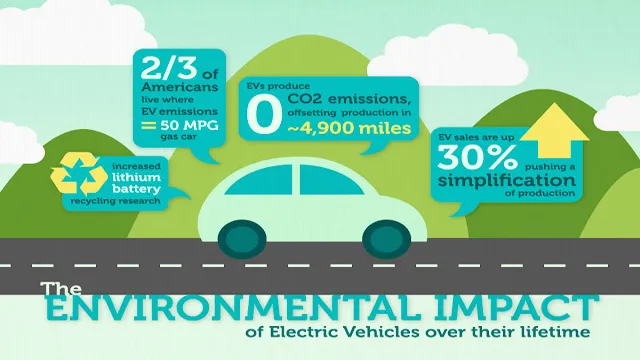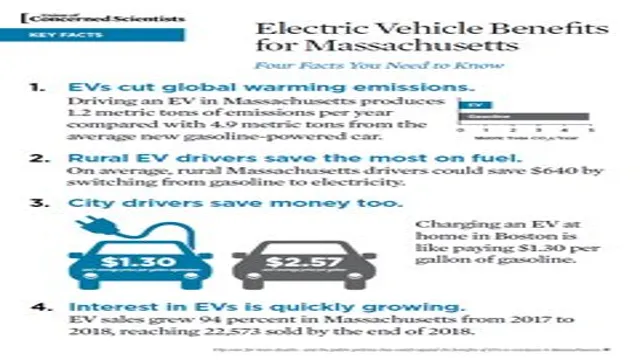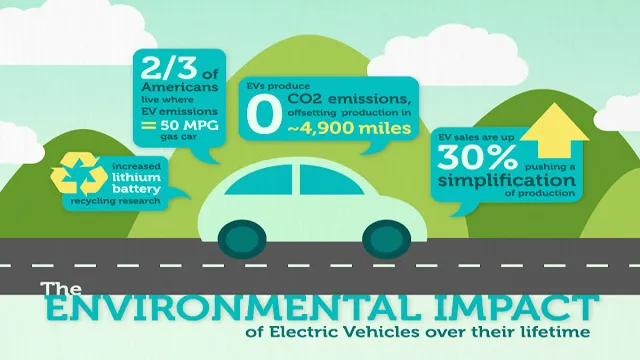Revving Up the Green: Discovering the Astonishing Benefits of Electric Cars on the Environment
Electric cars have become increasingly prevalent in modern society. With concerns over environmental sustainability rising rapidly, electric cars are seen as a viable option for reducing carbon emissions and reducing our impact on the environment. While the concept of electric cars is not new, advancements in technology have made it possible for them to become more efficient and practical for everyday use.
However, many people may still be wondering about the actual impact electric cars have on the environment. Are they really as eco-friendly as they are promoted to be? In this blog, we will explore the relationship between electric cars and the environment and address some of the common misconceptions surrounding this topic.
Reducing Air Pollution
Electric cars are becoming more widespread as people begin to recognize the benefits of reducing air pollution. These vehicles don’t produce tailpipe emissions like traditional gasoline-powered cars, which means they don’t contribute to the smog and haze that we see in our cities. This reduction in pollution has a number of environmental benefits, including improvements in air quality and reductions in greenhouse gas emissions.
Additionally, electric cars can help reduce our dependence on foreign oil, which not only makes us less vulnerable to price spikes, but helps reduce the overall amount of CO2 that’s released into the atmosphere. Overall, making the switch to electric cars is a powerful way to reduce your carbon footprint and help create a cleaner, more sustainable future for all.
Zero Emissions
Zero emissions are becoming increasingly important as air pollution continues to cause health problems and environmental damage. By reducing emissions, we can improve both the air we breathe and the state of our planet. One way to achieve this is by using electric vehicles, which produce no carbon emissions and contribute significantly less to air pollution.
Another option is to use public transportation or other forms of shared transportation, reducing the number of cars on the road and therefore decreasing emissions. Additionally, businesses can utilize renewable energy sources such as solar or wind power to reduce their carbon footprint and further reduce emissions. By collectively working towards zero emissions, we can make a significant impact on the health of our planet and our communities.

Less Smog
One of the most pressing environmental issues of our time is air pollution. Our cities are filled with smog and harmful particles that have adverse effects on both human health and the environment. To combat this problem, we must take steps to reduce air pollution.
This can be done by using cleaner sources of energy, such as wind and solar power, and transitioning away from fossil fuels. Additionally, implementing measures such as carpooling and using public transportation can significantly reduce the number of vehicles on the road, and consequently, the amount of pollution they emit. By reducing air pollution, we can improve the quality of life for ourselves and future generations, while also protecting the planet.
It’s up to all of us to do our part and take action against this critical issue.
Saving Natural Resources
The benefits of electric cars on the environment are numerous and can play a significant role in saving natural resources. By reducing or even eliminating the need for gasoline, electric cars can drastically reduce harmful emissions and help combat air pollution. This not only benefits our health, but it also helps to protect the environment and preserve natural resources.
Furthermore, electric cars tend to require less maintenance than traditional cars, which means fewer natural resources are needed to produce replacement parts. Plus, since electric cars don’t have an engine, they can be built with lighter materials, which means less demand for certain raw materials. Overall, electric cars offer a wide range of benefits for the environment, and they have the potential to be a major contributor towards a more sustainable future.
Less Dependence on Fossil Fuels
As we continue to rely on fossil fuels, we deplete precious natural resources that cannot be replenished, such as oil and coal. The burning of fossil fuels also contributes to harmful greenhouse gas emissions, which contribute to climate change and other environmental consequences. By embracing alternative sources of energy, such as solar, wind, and hydro power, we can reduce our dependence on fossil fuels and preserve our resources for future generations.
Not only can we save natural resources, but we can also improve the quality of air and water, and create sustainable communities. It’s time to prioritize the long-term health of our planet, and lessening our dependence on fossil fuels is a crucial step towards achieving this goal. So let’s embrace renewable energy and work towards a cleaner, healthier future for all.
Reduced Mining for Raw Materials
Reduced Mining for Raw Materials: Saving Natural Resources Mining for raw materials such as coal, metals, and minerals has a significant impact on the environment. It involves the disturbance and removal of vast areas of natural habitats, leading to deforestation, soil erosion, and water pollution. However, modern recycling practices have led to a reduced reliance on mining for raw materials, saving natural resources and reducing environmental damage.
Recycling is an integral part of reducing mining for raw materials. By recycling materials like aluminum, copper, and steel, we can save energy and preserve natural resources. Recycling just one aluminum can save enough energy to power a television for three hours.
Furthermore, the production of new aluminum from recycled cans consumes 95% less energy than producing aluminum from raw materials. Moreover, recycled materials provide the same quality and functionality as raw materials. Recycled steel is just as strong and durable as virgin steel and can be used for the same applications.
Using recycled materials also decreases waste in landfills and cuts down greenhouse gas emissions. In conclusion, reducing mining for raw materials by recycling is a sustainable practice that benefits the environment. Recycling is vital in saving natural resources and reducing landfilled waste.
By being mindful of our consumption and waste disposal habits, we can contribute to a more sustainable future.
Less Noise Pollution from Engines
One of the many benefits of electric cars is that they produce less noise pollution than traditional engine vehicles. The soft hum of an electric car driving down the street is a refreshing sound compared to the deafening roar of an engine. This isn’t just a pleasant bonus, however.
Reducing noise pollution is essential to preserving natural resources. Think about it: when an environment is full of constant noise, it becomes harder for animals to communicate and mate, which can lead to a decline in certain species populations. Additionally, it’s been shown that noise pollution can have negative effects on human health, causing stress and even cardiovascular disease.
By opting for an electric car instead of a traditional vehicle, you’re doing your part to reduce this type of pollution. It’s a small step, but by taking small steps together, we can make a big impact on the health of our planet.
Improving Climate Change
Electric cars are becoming more popular as people look for ways to reduce their impact on the environment. One of the biggest benefits of electric cars is their minimal carbon footprint, which helps to combat climate change. When compared to traditional gasoline-powered vehicles, electric cars produce far fewer greenhouse gas emissions and pollutants.
In addition to being better for the environment, electric cars also offer a range of other benefits. They are typically cheaper to maintain and operate, with lower fuel and maintenance costs than gas-powered cars. Because they don’t rely on combustible fuels, they are also safer to operate, with a lower risk of fire or explosion.
As more people switch to electric cars, we can expect to see a significant reduction in carbon emissions, helping to protect the planet for future generations. It’s clear that electric cars are the way of the future, and a smart choice for anyone who wants to reduce their impact on the environment and save money at the same time.
Reducing Greenhouse Gas Emissions
Reducing greenhouse gas emissions is crucial in combating climate change. By decreasing the amount of carbon dioxide and other harmful gasses that are released into the atmosphere, we can slow down the rate of global warming and its negative effects on the planet. There are many ways in which we can reduce greenhouse gas emissions in our daily lives.
Simple changes such as using public transportation, walking or cycling, and reducing energy consumption through turning off lights and appliances when not in use are effective methods. Additionally, governments and corporations can implement policies and regulations to reduce emissions on a larger scale. Examples of these policies include carbon taxes, emissions trading schemes, and incentives for using renewable energy sources.
Together, we can make a significant impact on our planet’s future by taking action to reduce greenhouse gas emissions. Let’s work towards improving our planet’s health and making a positive impact for future generations.
Less Global Warming
Improving climate change is a critical issue that cannot be ignored any longer. Global warming has led to devastating changes in our planet’s weather patterns, causing natural disasters, melting of polar ice caps, and rising sea levels. However, we can take steps to reduce global warming and halt its destructive effects.
One way to do this is by switching to renewable energy sources such as wind and solar power. By reducing our dependence on fossil fuels, which release greenhouse gases that trap heat in the atmosphere and lead to global warming, we can decrease the amount of carbon emissions and pollutants in the environment. Additionally, we can encourage individuals and companies to adopt eco-friendly practices in their daily lives, such as reducing waste and conserving water.
Together, small changes can make a big impact in reducing global warming and improving the health of our planet.
Conclusion: Electric Cars are the Eco-Friendly Choice
In conclusion, electric cars are more than just sleek and innovative modes of transportation – they’re also the key to a greener future. With zero emissions and reduced dependency on fossil fuels, electric cars provide a cleaner and more sustainable way to get from point A to point B. And let’s not forget the added bonus of saving on gas money while helping to combat climate change.
So, if you’re tired of paying at the pump and want to do your part for the planet, consider making the switch to an electric car. Your wallet and the environment will thank you!”
FAQs
How do electric cars benefit the environment?
Electric cars produce zero emissions, which reduces air pollution and improves air quality. They also reduce greenhouse gas emissions, which can help slow down climate change.
Do electric cars contribute to noise pollution?
Electric cars are much quieter than gasoline cars, which can reduce noise pollution in urban areas.
Are electric cars more expensive to maintain?
Electric cars have fewer parts than gasoline cars, which means they require less maintenance overall. Additionally, electric cars do not need oil changes or other regular maintenance associated with gasoline cars.
How does the production of electric cars affect the environment?
The production of electric cars can have an impact on the environment, as the batteries require rare earth metals and other materials that must be mined and processed. However, studies have shown that even taking this into account, electric cars still have a lower overall environmental impact than gasoline cars.




